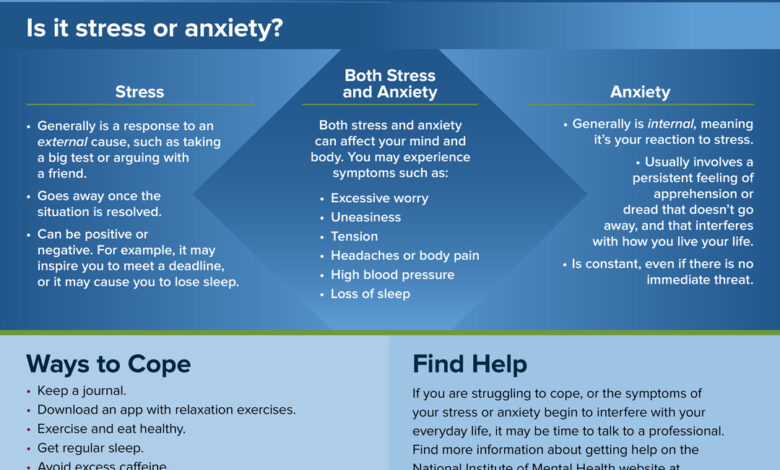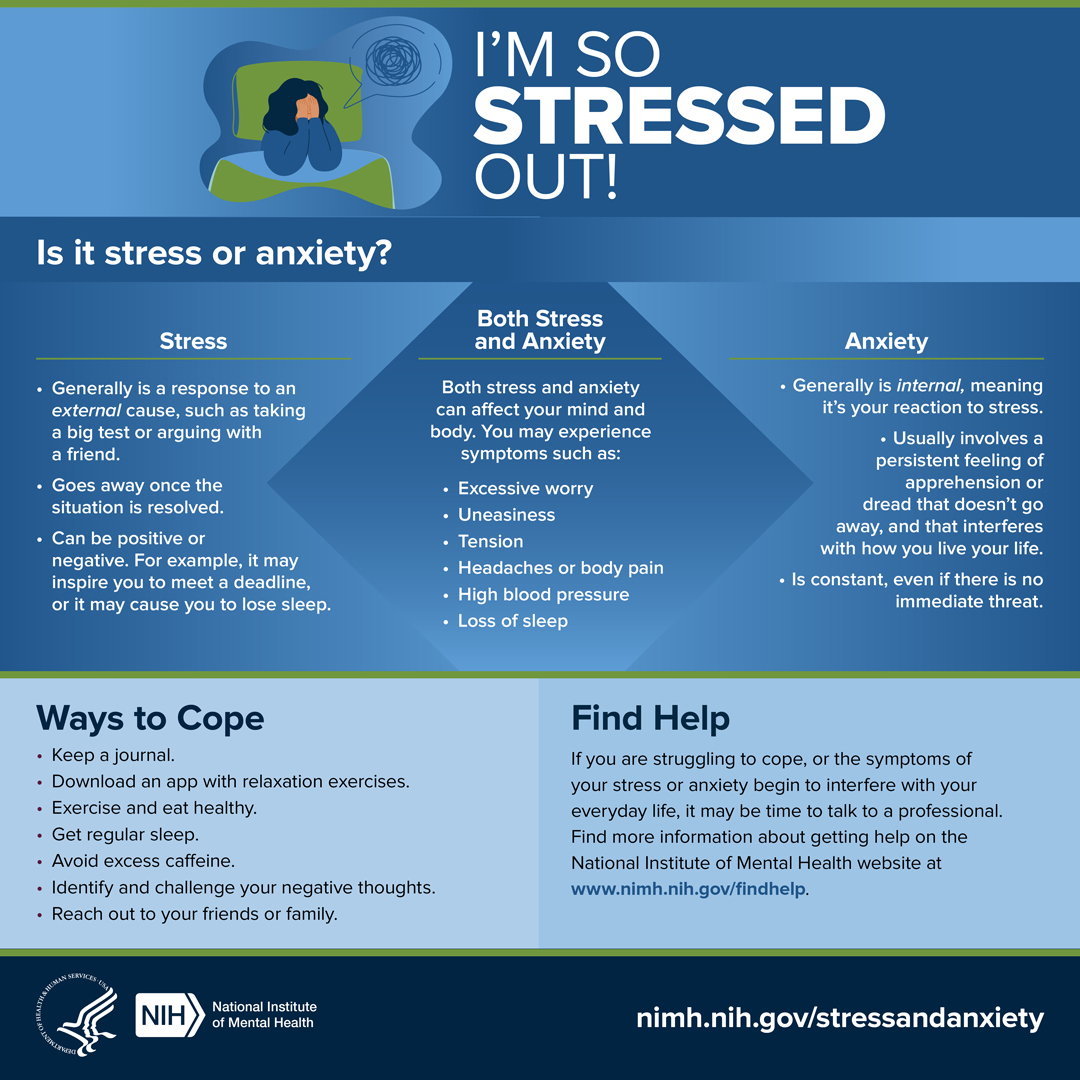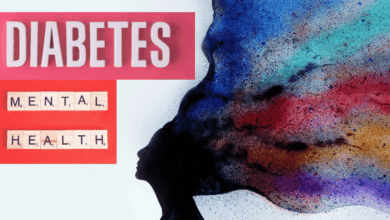
When staying informed is stressing you out try these simple tips – When staying informed is stressing you out, try these simple tips. Feeling overwhelmed by the constant stream of news? It’s completely understandable. This post dives into practical strategies for managing information overload, helping you stay connected without sacrificing your well-being. We’ll explore recognizing the signs of information overload, curating a balanced news diet, building healthy habits, taking control of your narrative, and seeking support when needed.
Ready to reclaim your peace of mind?
This guide offers actionable steps to help you navigate the modern information landscape. From identifying your triggers to creating a personalized routine, we’ll empower you to regain control and prioritize your mental health. We’ll delve into the nuances of information consumption, highlighting the difference between healthy curiosity and problematic intake.
Recognizing the Problem

Staying informed is crucial in today’s world, but the constant influx of news and information can easily become overwhelming. This pressure to stay current can lead to stress, anxiety, and even burnout. Understanding the signs and triggers of information overload is the first step towards managing it effectively. This guide provides strategies to recognize when your news consumption is becoming a problem.Excessive information intake can negatively impact mental well-being.
Chronic exposure to distressing news, political conflicts, and global events can lead to heightened anxiety, fear, and feelings of helplessness. Learning to navigate the news responsibly is essential for maintaining emotional balance and overall mental health.
Identifying Information Overload Triggers
Recognizing when information intake crosses the line from healthy curiosity to problematic consumption is key to managing stress. Here are some common indicators of information overload:
- Feeling overwhelmed or stressed after consuming news.
- Experiencing negative emotions such as anxiety, fear, or anger after news consumption.
- Feeling a loss of control or helplessness due to the sheer volume of information.
- Difficulty concentrating or focusing on tasks outside of news consumption.
- Spending excessive time and effort staying updated, impacting other important areas of life.
Examples of News Consumption Leading to Stress
News consumption can trigger stress in various situations. Examples include:
- Exposure to constant negative news cycles about political conflicts, economic downturns, or global crises can lead to feelings of helplessness and anxiety.
- The constant bombardment of sensationalized news headlines and social media posts can cause stress and overwhelm.
- The pressure to maintain a sense of current affairs and participate in online discussions can lead to stress and fatigue.
- A lack of control over the information stream and the inability to filter it can cause mental exhaustion and stress.
Impact on Mental Well-being
Excessive information intake can significantly affect mental well-being. Chronic exposure to distressing news can result in:
- Increased anxiety and fear.
- Heightened levels of stress hormones.
- Sleep disturbances and difficulty concentrating.
- Emotional exhaustion and burnout.
- A sense of helplessness and hopelessness.
Self-Assessment Questionnaire
This questionnaire can help you identify your personal information overload triggers:
| Question | Response Options |
|---|---|
| How often do you feel overwhelmed or stressed after consuming news? | Rarely, Sometimes, Often, Very Often |
| How frequently do you experience negative emotions after news consumption? | Rarely, Sometimes, Often, Very Often |
| Do you feel a loss of control or helplessness due to the sheer volume of information? | No, Slightly, Moderately, Very Much |
| How often do you find it difficult to concentrate on tasks outside of news consumption? | Rarely, Sometimes, Often, Very Often |
| Do you spend excessive time and effort staying updated, impacting other important areas of life? | No, Slightly, Moderately, Very Much |
Distinguishing Healthy Curiosity from Problematic Consumption
Healthy curiosity involves actively seeking information to understand events and their impact. Problematic consumption involves an obsessive need to be constantly updated, leading to stress and negative emotions.
- Healthy curiosity is driven by a desire to understand and learn.
- Problematic consumption is driven by a fear of missing out or an anxiety about being uninformed.
Signs of Stress Related to Staying Informed
Recognizing the signs of stress is crucial for managing it effectively. These signs include:
- Irritability and mood swings.
- Difficulty sleeping or maintaining sleep.
- Changes in appetite or eating habits.
- Physical tension, headaches, or muscle aches.
- Withdrawal from social activities.
Curating Your Information Diet
Staying informed is crucial in today’s world, but the sheer volume of information can be overwhelming and even stressful. It’s essential to cultivate a healthy relationship with news and information, one that provides valuable insights without causing anxiety or burnout. This involves carefully curating your information diet, much like you would curate a balanced meal plan.A well-curated information diet focuses on providing the right amount of the right kind of information, tailored to your needs and interests.
This means actively choosing your sources, controlling your intake, and prioritizing what truly matters. It’s about making informed decisions about the news and information you consume, rather than passively absorbing everything that comes your way.
Organizing Your News Sources
A crucial step in curating your information diet is creating a structured overview of your news sources. This includes identifying sources with varying levels of bias. This allows for a more balanced perspective. Note the political leaning, known biases, and reputation of each source. Creating a simple table can be helpful for tracking this information.
Feeling overwhelmed by the constant news cycle? Staying informed can be tough, but there are ways to manage the stress. Understanding what stress truly is can help. For a deeper dive into the science behind stress, check out this helpful resource on what to know about stress. Once you grasp the nature of stress, you can start implementing simple strategies to regain control, like limiting your news intake or focusing on reliable sources.
These techniques can significantly reduce the negative impact of staying informed on your well-being.
| News Source | Bias (e.g., Left, Right, Center) | Reliability | Relevance to You |
|---|---|---|---|
| Example: The New York Times | Center | High | High |
| Example: Breitbart News | Right | Mixed | Low |
| Example: The Guardian | Left | High | Medium |
Filtering Information for Reliability and Relevance
To effectively filter information, evaluate the source’s reputation, author expertise, and evidence-based reporting. Look for corroboration across multiple, unbiased sources. Fact-checking websites can be invaluable tools in this process. Avoid sources that consistently present misleading or unsubstantiated claims.
Managing Consumption Frequency and Duration
Determine how often and for how long you want to consume news. Establish a realistic schedule that works for your lifestyle. Avoid overwhelming yourself with constant updates. Setting time limits for news consumption can help you manage your stress levels and avoid information overload.
Comparing Different Consumption Methods
News consumption methods vary significantly. Apps offer convenient access, but they can also lead to constant notifications and distractions. Websites allow for more in-depth reading and potentially more control over the information you encounter. Consider which method best suits your needs and focus.
Pros and Cons of Subscriptions
Subscribing to news outlets can provide access to exclusive content, but it also commits you to a specific editorial perspective. Consider the pros and cons of subscriptions based on your needs. For example, a subscription to a niche publication might offer specialized insights, but it may also limit your exposure to diverse viewpoints.
Prioritizing Beneficial Information
Identify the information that’s most relevant to your interests and goals. Focus on topics that matter most to you. Prioritize news and information that directly impacts your life or your community.
Alternative Sources for Balanced Perspectives
Seek out alternative news sources that offer a more balanced perspective. Consider publications that specialize in data analysis or investigative journalism. This approach will help broaden your understanding and promote a more complete picture.
Feeling overwhelmed by staying informed about current events? It’s totally understandable. Sometimes, the sheer volume of news can be stressful. Thankfully, there are ways to manage the information overload. For example, consider focusing on reputable sources and limiting your consumption of social media updates.
This is especially important when dealing with sensitive topics like reproductive rights, like the important information about stocking up on Plan B, as outlined in this helpful article: plan b what to know about stocking up after overturn of roe v wade. By taking a strategic approach to information intake, you can stay informed without letting it consume you.
Managing Emotional Responses to Information
Unfollowing or unsubscribing from sources that trigger negative emotions is a valid strategy. This helps to manage stress and improve overall well-being. Actively curate your news feed to include only sources that promote positive and constructive engagement.
Building Healthy Habits: When Staying Informed Is Stressing You Out Try These Simple Tips
Staying informed is crucial, but the constant barrage of news and updates can easily become overwhelming. Learning to manage this information overload is essential for maintaining mental well-being. This section focuses on developing healthy habits that allow you to navigate the information landscape without sacrificing your peace of mind. By integrating these practices into your daily routine, you can foster a more balanced and stress-free relationship with the world of information.Information overload can trigger a cascade of stress responses, impacting sleep, mood, and overall productivity.
Adopting healthy habits is crucial to mitigate these effects. These techniques are designed to help you cultivate a more mindful and intentional relationship with the information you consume.
Managing Stress from Information Overload
Information overload can manifest in various ways, leading to stress and anxiety. Recognizing these signs is the first step toward managing the issue effectively. Stress symptoms can range from irritability and difficulty concentrating to physical tension and sleep disturbances. By actively addressing these symptoms, you can create a more supportive environment for your mental health.
Mindfulness Exercises for Mental Calmness
Mindfulness practices are powerful tools for managing stress related to information overload. These exercises promote mental calmness by focusing on the present moment. Mindful breathing, for example, involves paying attention to the sensation of your breath entering and leaving your body, grounding you in the present and reducing anxiety. Other exercises include body scans, where you systematically bring awareness to different parts of your body, and mindful walking, where you focus on the sensations of each step.
These techniques can effectively calm the mind and reduce the impact of information overload.
Setting Boundaries Around News Consumption
Setting boundaries around news consumption is essential for maintaining a healthy relationship with information. Determine specific times for news intake, such as during a designated news hour, and stick to it. Avoid checking news updates throughout the day. This structured approach helps you manage your exposure to information and prevents it from consuming your entire day. This conscious decision to limit news intake creates a healthier balance between staying informed and protecting your mental well-being.
Strategies for Disconnecting from Digital Sources
Disconnecting from digital sources is vital for mental restoration. Establish designated “digital detox” periods, such as during weekends or evenings. Put your phone away, turn off notifications, and engage in activities that do not involve screens. This deliberate disconnection allows your mind to rest and recharge, preventing burnout from information overload. It’s important to schedule dedicated time for activities that do not involve screens, allowing your mind to disconnect and refresh.
Scheduling Breaks and Downtime
Creating a schedule that incorporates breaks and downtime is crucial for managing information intake. Schedule regular breaks throughout the day, and avoid continuously checking news updates. These breaks can involve activities like taking a walk, listening to music, or engaging in a hobby. Regular breaks allow your mind to process the information it has absorbed and prevent mental fatigue.
Engaging in Relaxing Activities
Engaging in activities that promote relaxation is a vital part of managing stress from information overload. Activities like reading, spending time in nature, or pursuing hobbies offer a welcome escape from the constant stream of news updates. These activities provide opportunities to de-stress and recharge, promoting mental well-being. Make time for activities that bring you joy and relaxation.
Feeling overwhelmed by all the pregnancy info? It’s totally understandable! Sometimes, staying informed can feel like a full-time job. One area that often causes stress is the common misconception of “eating for two.” Learning about the right nutrition during pregnancy, rather than overeating, is crucial. Check out this helpful guide on don’t eat for two while pregnant for practical advice on healthy eating habits.
Taking it one step at a time, focusing on reliable sources, and setting realistic expectations can help you stay informed without the stress.
Prioritizing Personal Well-being
Prioritizing personal well-being over constant news updates is paramount for maintaining mental health. Recognize that staying informed does not necessitate constant engagement with news updates. Make time for activities that nourish your mind and body, such as exercise, healthy eating, and quality sleep. By prioritizing your well-being, you create a foundation for better managing information overload.
Sample Daily Routine for Relaxation and Reflection
A sample daily routine can help integrate relaxation and reflection into your daily life.
| Time | Activity |
|---|---|
| 7:00 AM | Wake up, light stretching, gentle yoga |
| 8:00 AM | Breakfast, light reading |
| 9:00 AM | Work/Studies |
| 12:00 PM | Lunch break, short walk |
| 1:00 PM | Work/Studies |
| 5:00 PM | Relaxation activity (e.g., listening to music, reading a book) |
| 6:00 PM | Dinner, conversation with loved ones |
| 7:00 PM | Quiet time for reflection, light stretching |
| 8:00 PM | Prepare for sleep |
This routine prioritizes well-being by incorporating periods for relaxation and reflection, thereby managing information overload.
Taking Control of Your Narrative
Staying informed is crucial in today’s world, but the sheer volume of information can be overwhelming. It’s easy to feel bombarded, stressed, and even manipulated. Learning to navigate this information landscape effectively is about more than just consuming news; it’s about developing a critical mindset and taking ownership of how you process and react to the world around you.
This involves understanding the difference between facts and opinions, evaluating news sources with a discerning eye, and managing the emotional impact of information consumption.This section will explore strategies for developing a healthier relationship with information, empowering you to be an informed and resilient individual. We’ll examine techniques for identifying and managing biases, as well as building a robust system for fact-checking and verifying information.
Differentiating Facts and Opinions
Distinguishing between facts and opinions is fundamental to critical thinking. Facts are verifiable statements that can be proven true or false. Opinions, on the other hand, express beliefs, judgments, or perspectives. Recognizing the difference empowers you to approach information with a more discerning eye.
Critical Thinking in News Evaluation
Critical thinking skills are indispensable in evaluating news. These skills involve questioning the source, examining the evidence presented, considering alternative perspectives, and looking for potential biases. A critical approach ensures you are not simply accepting information at face value, but rather engaging with it thoughtfully and thoroughly.
Challenging Your Own Biases, When staying informed is stressing you out try these simple tips
We all possess inherent biases, which can influence how we interpret information. Recognizing and challenging these biases is crucial for unbiased information consumption. This involves actively seeking out perspectives that differ from your own, considering multiple viewpoints, and consciously evaluating your own assumptions.
Managing Negative Emotions
News consumption can evoke a range of emotions, from anxiety to anger. Developing strategies for managing these emotions is key to maintaining a healthy relationship with information. These strategies can include setting time limits for news consumption, focusing on reliable sources, and engaging in activities that promote emotional well-being.
Trusted Sources for Fact-Checking
Building a network of trusted fact-checking organizations is vital for verifying information. These organizations meticulously analyze claims and provide reliable assessments.
- Snopes
- PolitiFact
- FactCheck.org
- Reuters
- Associated Press
These resources help you separate credible information from misinformation.
Seeking Diverse Perspectives
Engaging with a variety of viewpoints is essential for a comprehensive understanding of any issue. Actively seeking out diverse sources of information, including those that challenge your own perspectives, is a crucial aspect of responsible information consumption.
Avoiding Misinformation and Rumors
Misinformation and rumors can spread rapidly in the digital age. Being aware of this risk and taking steps to avoid spreading them yourself is crucial. This includes verifying information before sharing it and promoting critical thinking in others.
Trustworthy Sources for Balanced Information
Developing a list of trustworthy sources that offer balanced and comprehensive perspectives is essential. This list should include reputable news organizations, academic journals, and other sources that strive for objectivity.
- The New York Times
- The Washington Post
- The Guardian
- BBC News
- NPR
These organizations, while not without bias, aim to provide a comprehensive and balanced view of events.
Seeking Support and Resources

Staying informed is crucial in today’s world, but the constant influx of information can be overwhelming. This can lead to significant stress, impacting our mental well-being. Recognizing the need for support is a vital step in managing this stress effectively. It’s not a sign of weakness, but a sign of strength to acknowledge the need for assistance and to seek resources to help you navigate the information landscape with more ease and resilience.Understanding that you’re not alone in feeling overwhelmed by information overload is the first step towards finding effective support.
Many people experience this feeling, and there are various strategies and resources available to help you cope. Reaching out to others and utilizing professional support systems can significantly reduce stress and improve your overall well-being.
Support Systems for Managing Stress
Various support systems can be incredibly helpful in managing stress related to information overload. These systems provide a network of understanding and compassion, offering a space for shared experiences and practical strategies. Friends, family, and support groups can offer crucial emotional and practical assistance.
- Friends and Family: Sharing your feelings with trusted friends and family can be immensely beneficial. They can offer a listening ear, provide perspective, and remind you of your strengths and resilience. Explaining your experience of information overload to them will help them understand your situation better. Open and honest communication is key to establishing a supportive environment.
- Support Groups: Joining a support group, either in-person or online, allows you to connect with others facing similar challenges. Sharing experiences with people who understand can alleviate feelings of isolation and provide practical coping mechanisms. Support groups offer a sense of community and validation.
- Online Communities: Online forums and social media groups dedicated to mental health or information overload can provide valuable support. These communities offer a space for sharing experiences, seeking advice, and connecting with like-minded individuals. Engaging in these online communities can reduce feelings of isolation.
Communicating with Loved Ones About Information Overload
Open communication with loved ones about information overload is essential for seeking support and understanding. This communication can help manage expectations and create a supportive environment. Clearly and calmly express how the constant flow of information is affecting you.
- Be Specific: Describe the specific aspects of information overload that are causing you stress, such as the amount of time spent on news or social media, or the feeling of being overwhelmed by conflicting narratives.
- Identify Triggers: Help loved ones understand the triggers that lead to feelings of stress and anxiety, so they can better support you.
- Request Support: Clearly state how your loved ones can support you. This could involve limiting exposure to news or providing a safe space to discuss feelings. It is crucial to be clear about what kind of support you need.
Importance of Professional Help
When stress related to staying informed becomes unmanageable, seeking professional help is crucial. A mental health professional can provide tailored strategies and coping mechanisms to address the underlying issues contributing to your stress. A therapist can provide a safe space to discuss your feelings and develop strategies to manage information overload.
Mental Health Resources
Seeking professional help is a strength, not a weakness. There are many resources available to connect you with qualified mental health professionals.
| Resource | Description | Link (Example) |
|---|---|---|
| Your Primary Care Physician | Your primary care physician can provide referrals to mental health professionals. | (Insert link to your local doctor’s office) |
| Online Therapy Platforms | Many online platforms offer affordable and convenient therapy options. | (Insert link to a reputable online therapy platform) |
| National Suicide Prevention Lifeline | Provides 24/7 support for individuals experiencing emotional distress. | (Insert link to the National Suicide Prevention Lifeline) |
Online Communities and Forums
Online communities and forums offer a valuable platform for connecting with others who share similar experiences. This can lead to valuable insights, shared coping mechanisms, and a sense of community. Finding support in online spaces can be particularly helpful for individuals who may find it challenging to access in-person support.
- Online Forums: Online forums specifically focused on mental health or information overload can offer a safe space for discussions and support. They provide a community where individuals can connect and share experiences.
- Benefits of Connecting with Like-Minded People: Connecting with others who understand your experiences can provide validation, support, and practical strategies for coping. Shared experiences can foster a sense of community and resilience.
Finding Support Groups or Counselors
Finding support groups or counselors for dealing with stress is often a matter of searching for resources in your local area or utilizing online platforms. Your primary care physician or a trusted friend can offer guidance in finding the right support.
- Local Mental Health Organizations: Many local mental health organizations offer support groups and counseling services. Contact your local mental health organization for resources in your area.
- Online Therapy Directories: Online directories specializing in mental health can help you find qualified therapists or counselors who can provide tailored support for dealing with information overload.
Outcome Summary
In conclusion, managing information overload isn’t about shutting out the world, but about finding a healthy balance. By implementing these strategies, you can curate a news diet that nourishes your mind without causing undue stress. Remember, prioritizing your well-being is crucial. Take control of your information intake and cultivate a more peaceful relationship with the news. You deserve to be informed without being overwhelmed.
Start small, and gradually build healthy habits that empower you to stay informed without sacrificing your peace of mind.





